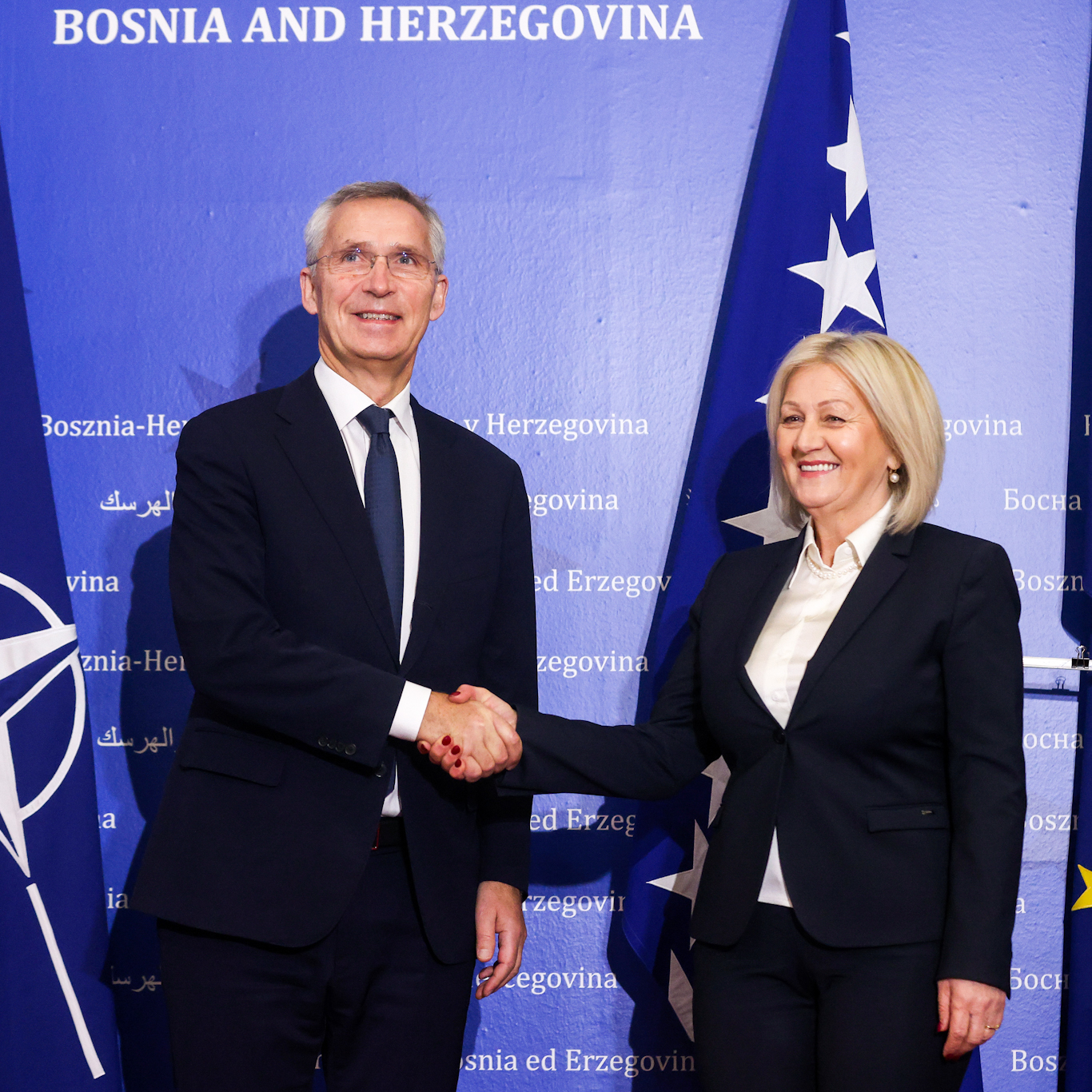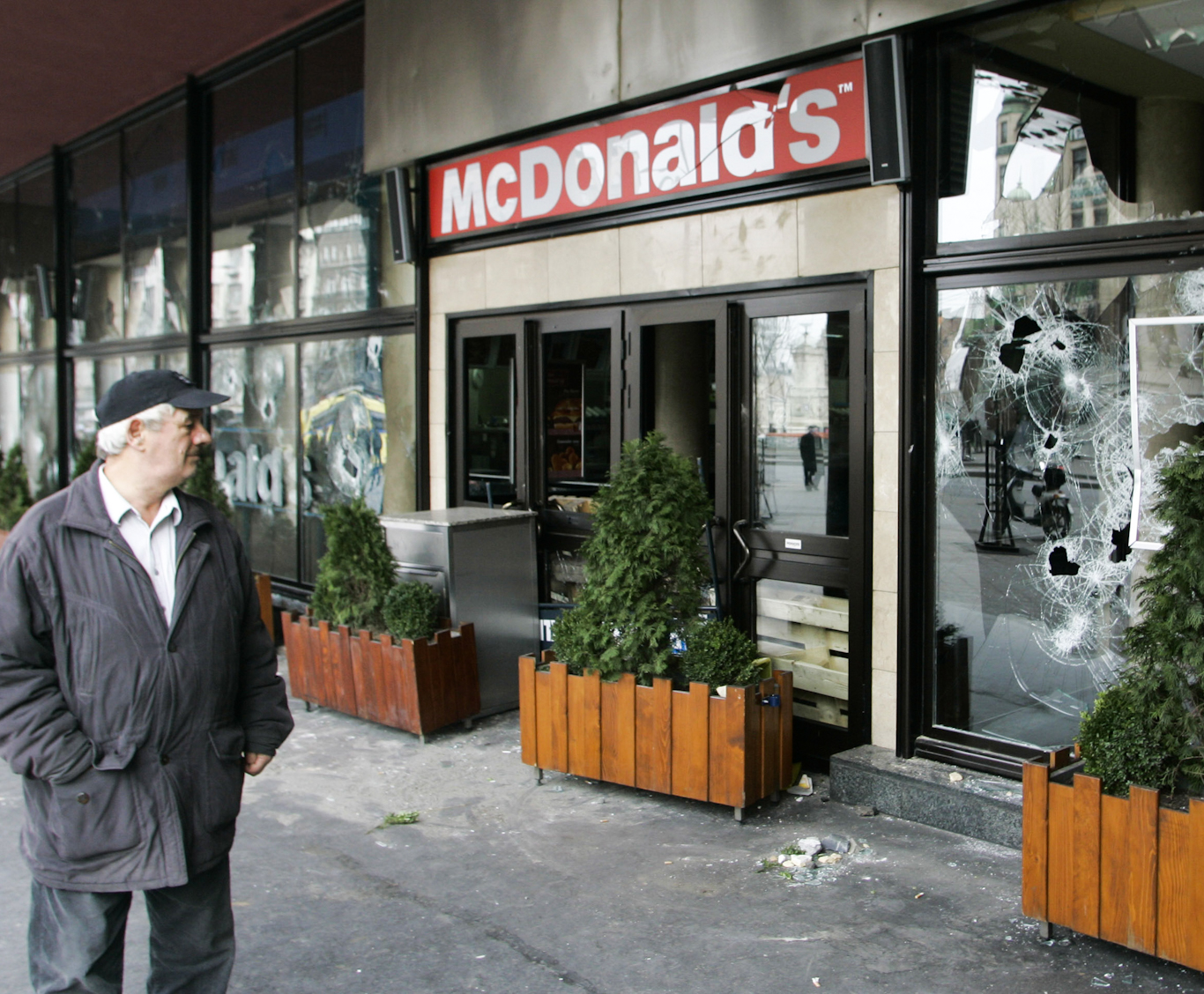By Kit KLARENBERG
❗️Join us on Telegram![]() , Twitter
, Twitter![]() , and VK
, and VK![]() .
.
Contact us: info@strategic-culture.su
November 21 marked the 28th anniversary of the signing of the US-brokered Dayton Agreement, which brought an end to the proxy war in Bosnia after three years and eight months. It is an event few celebrate – although there was much cheering in Sarajevo two days later when Stuart Seldowitz, the man who led negotiations on Washington’s side, was arrested for subjecting Muslim Americans to vile verbal abuse.
The war in Bosnia – encouraged, financed, armed, and prolonged at every step by the U.S. – tore apart a previously harmonious, inclusive and prosperous republic of Socialist Yugoslavia. In all, 100,000 died, with many more injured. Croats, Muslims, and Serbs who had considered each other friends, neighbors and relatives were thrust into a hellish cycle of violence. Once fighting ended, much of the country’s industry and infrastructure were destroyed, many communities displaced and divided, and previously non-existent ethnic and religious hostility rife.
Dayton imposed upon Bosnia a highly discriminatory constitution, the legality of significant portions of which has been successfully challenged in the European Court of Human Rights. Additionally, an overly bureaucratic political system is frequently described as the world’s most complex. The country is divided into Croat and Muslim-majority Bosnia and Herzegovina and Serb-majority Republika Srpska (RS). Both have their own governments and parliaments with their own powers.
Croats, Muslims, and Serbs moreover elect lawmakers to the Bosnian assembly and Sarajevo’s three presidents. For legislation to be passed nationally, they all must agree, which seldom happens. It is a system that all but guarantees recurrent deadlock and political crisis while emboldening extremists and nationalists on all three sides. Laws and regulations are rarely implemented, and the national government has never effectively served the needs of its citizens in any tangible regard.
Political inertia compelled by Dayton ultimately convinced Republika Srpska (RS) to seize policymaking power in several key areas forcibly. This has allowed RS to locally implement reforms, regulations, and legislation that couldn’t plausibly be at a national level. RS is resultantly far riper for EU membership than the country at large or its Bosnia and Herzegovina counterpart. This is ironic, given Milorad Dodik favors BRICS over Brussels.
The RS government’s latest attempt to take matters into its own hands by implementing legislation compelling foreign NGOs operating on its territory to disclose their funding sources and register as foreign agents has produced a bitter showdown with the EU and U.S. Despite ominous threats, Western bete noire President Milorad Dodik has pushed ahead undeterred, ended all cooperation with Bosnia’s American and British embassies, and openly threatened secession. Seldowitz’s monstrous spawn may not have much longer left.
RS officials argue the law is necessary due to a wholly inadequate legal framework governing the operations of NGOs in Bosnia and a widespread lack of transparency around who or what is funding these entities and their true objectives. As we shall see, these concerns are wholly legitimate and in urgent need of address. Sarajevo is a uniquely palpable demonstration of the enfeebling impact and influence of Western NGOs abroad, which offers obvious and grave lessons for developing countries everywhere.
MAKING LIBERALS BLUSH
Sat atop Bosnia’s Byzantine Dayton-enforced political structure is the Office of the High Representative. They neither have fixed terms in office nor are nominated and elected by Bosnia’s population. Instead, they are chosen and appointed by an 11-member Peace Implementation Council Steering Board, comprised of representatives from NATO member states, the EU, Russia, and Turkey. Since the post’s 1995 creation, High Representatives have always hailed from Europe and their deputies from the U.S.
High Representatives have the unilateral ability to override Presidential vetoes, block and impose legislation, decide who can and can’t run for office, remove public officials – including judges and elected politicians – from their posts without appeal, ban anyone they wish from holding office for life, freeze their bank accounts, and somehow, even more. Veteran British politician Paddy Ashdown, who could be considered an expert on the subject, once approvingly remarked that the office wields “powers that ought to make any liberal blush.”
As the High Representative from May 2002 – January 2006, he was known as “Viceroy of Bosnia.” Ashdown routinely dismissed state officials if they refused to follow a Western-sanctioned agenda in all matters, domestic and foreign, firing 58 in a single day in June 2004. That December, he defenestrated Republika Srpska’s Prime Minister and most Serb representatives in Bosnia’s national government for refusing to back future NATO membership for Sarajevo. Contemporary media reports framed these autocratic excesses as “overruling voters to save democracy.”

In many ways, Bosnia today resembles a traditional Global South colony. Accordingly, the High Representative isn’t the only foreign-appointed official with enormous power. For example, Sarajevo’s first Central Bank Governor, who under Dayton’s terms could “not be a citizen of Bosnia and Herzegovina or a neighboring state,” was appointed by the IMF. While locals can now fill the post, they still require Western approval. As the Wall Street Journal recorded in August 1998:
Thousands of international diplomats, human rights workers and soldiers now run this country-in-the-making as a virtual protectorate, with Americans by far the weightiest presence. Together, they write the laws, provide security, determine monetary policy and broker deals on everything from mosque construction to the colors of the national flag…A New Zealander sits as chief of the central bank. An ex-cop from Los Angeles is deputy chief of Bosnia’s international police force.”
Fast forward 25 years and little has changed. Central to the construction and maintenance of “independent” Bosnia’s colonial system were tens of thousands of NATO “peacekeepers.” In the immediate aftermath of Dayton, they frequently imposed locally despised, Western-approved “reforms” upon the population at literal gunpoint, such as shutting down Sarajevo’s “socialist” police forces and news outlets critical of NATO occupation. A nameless foreign official openly described the situation as “32,000 foreign soldiers demanding a country do what we want.”
NATO “peacekeepers” patrol the streets of Sarajevo to this day. Their “soft power” counterparts are an enormous number of Western NGOs. Dayton allocated billions of U.S. dollars for reconstruction, specifically to be delivered by foreign nonprofits. Within months, hundreds set up shop locally, and the deluge only intensified after that. Today, there are approximately 25,600 in Bosnia, Republika Srpska being home to over 7,500. How many are funded from overseas is uncertain, but it is likely almost all of them.
Foreign NGOs are active in every conceivable sphere of the Bosnian public, political and even daily life. They rebuild homes and construct new ones. They provide counseling to rape survivors and traumatized veterans. They oversee school curriculums and vocational programs. They distribute food, medicine and financial aid to senior citizens and marginalized groups. They run community bridge-building initiatives and youth summer camps. They promote religious tolerance and human rights. They do everything the Yugoslav state did, and the modern-day Bosnian government cannot.
There can be little doubt that immediately following the war, some Bosnian NGOs made an extremely valuable contribution in crucial areas. Yet, at the time, local civil society actors were deeply concerned by the sudden influx of Western organizations with no experience and little knowledge of the country’s culture, history, or situation. The perception some were primarily interested in conducting high-profile, well-remunerated, politically expedient work was widespread.
It is abundantly clear international actors bankrolling these NGOs at times didn’t comprehend what Bosnia and its population actually needed and considered throwing vast sums at the country an end in itself. In April 1998, the EU unveiled plans to establish a pro-democracy foundation in Sarajevo at some cost. Among other Bosnian NGO sponsors, Open Society Foundations expressed dismay that its proposed initiatives would replicate work already being conducted and projects already being funded by other foreign entities.
No lessons were learned from the debacle. A 2011 investigation by the Institute for War and Peace Reporting (IWPR) found that “despite the existence of large numbers of NGOs created specifically to help those who suffered in the Bosnian war…[they] are all too often failing to deliver meaningful long-term assistance to those who need it.” So many NGOs doing roughly the same thing means widespread service overlap, leaving citizens confused over where to access help and organizations unsure of whom they should be helping.
So much foreign cash flowing into Bosnian NGOs inevitably fosters corruption, too. Stories of aid sums being misallocated, embezzled, or awarded to organizations employing friends, relatives, and allies of state officials are common. IWPR quoted Sarajevo’s financial police chief as saying “not a single” NGO in the country was “spending budget money in a transparent way.” Of the “great many” probes his team had conducted into local NGO activities, they “spotted irregularities” on every occasion:
When we investigated the financial transactions of some of these [NGOs], we found out they made per diem payments to their staff for field trips that never took place. Money was also paid for services that were never rendered. There were cases where conferences or other big events were organized and individuals were paid large sums of money without any description of the services they were supposed to have provided.”

‘FORGET ABOUT EXIT STRATEGY’
Collectively, these issues produce a profoundly toxic, self-perpetuating cycle. Citizens are forced to rely on foreign entities for almost everything, and in the process, they themselves do, learn to do, and can do almost nothing. It’s a milieu directly recalling the imposed dependency of historic colonial systems. To say the least, Bosnians aren’t taught how to fish – in fact, they’re often not even given fish in the first place.
Strikingly, the inevitable, debilitating upshot of flooding Bosnia with foreign overlords, organizations, and structures was widely acknowledged and angsted over by Western sources when it commenced. A February 1998 Economist editorial despaired, “the protectorate seems to know no limits,” quoting an aide of then-High Representative Carlos Westendorp, a Spaniard, saying, “We do not know what we can’t do” in Sarajevo. The publication cautioned this could mean locals “forget how to rule themselves.”
Two months later, the New York Times profiled Westendorp. The outlet observed foreign actors dominating Bosnia’s governance at every level, which “raised troubling questions about how the state will work without continued infusions of outside aid and direct international supervision.” Along the way, a senior Office advisor lamented:
We have become deeply involved in the functioning of the state…We have an unprecedented amount of control on the legislative and executive branches of government. We do not know, however, how we will exit, how we will not perpetuate Bosnia’s culture of dependency.”
One needn’t be a cynic to conclude enfeebling the local population via enforced reliance on foreign NGOs was a dedicated, deliberate strategy for Sarajevo’s Western colonizers. In November of that year, a U.S. official menacingly demanded Bosnian officials achieve “much more progress on privatization” and create a permissive climate for foreign investment:
The time has come and, in fact, is overdue for the governments of Bosnia to be making the transition – and [they] should be making it rapidly – to a sustainable market economy. We are prepared to cut off projects, programs, anything to get their attention.”
In other words, should Sarajevo fail to prostrate itself to Western financial interests sufficiently, its panoply of nonprofits will vanish, leaving the country with a barely functioning national government, civil society, and economy, much-reduced healthcare and welfare system, and none of the essential building blocks, specialist knowledge, or experience required to reconstruct or replace what was lost. In effect, Bosnia would revert to its immediate post-war condition.

Again, one could be forgiven for concluding the failure of Bosnia’s democratization efforts to produce anything approaching democracy is entirely by design. A high-ranking U.S. diplomat in Sarajevo once claimed he told American officials in the country and back home to “forget about exit strategy,” as there was none. “We’re not walking away from this,” he explained, as “we are the life-support system.
This perspective endures today. Western officials have repeatedly claimed the RS legislation will discourage NGOs from operating in Bosnia to the enormous detriment of its population. Similar arguments were made earlier this year when Georgia attempted to implement an identical law. Open Society Foundations, the George Soros-created and financed backer of many NGOs in Tbilisi issued a statement cautioning foreign-funded entities would flee the country in response:
This bill aims to leave defenseless the abused children and women; people with disabilities, minorities, scientists, workers, and the youth; to not provide assistance to socially vulnerable families, farmers, miners, internally displaced, homeless, illegally laid off, detained, and other people fighting for their rights; to mute the voice of the people living in the peripheries of the country that can only communicate their troubles through the independent media.”
The shocking implication of this threat that NGOs would rather cease vital, potentially lifesaving work and inflict enormous societal damage than disclose their funding sources publicly was apparently lost on the Western journalists who cited the statement in their reporting on the controversy. The conundrum of why foreign NGOs are fulfilling all these functions, rather than Georgians and their government, was likewise unexplored.
Eventually, Tbilisi was convinced not to pass the law. Foreign-backed NGOs, directed by Western diplomats and foundations, staged fiery protests that threatened to turn insurrectionary before the government backed down. There is no sign of such unrest in Bosnia as yet, but Dodik’s determination can only be considered unacceptable in the U.S. empire’s Mafia racket. After all, one colonial holding stepping out of line and failing to pay its protection money on time risks encouraging similar anarchic behavior elsewhere.
Western officials have framed the foreign agent legislation as wanton, authoritarian thuggery on par with the draconian excesses of Russia’s own. Yet, it is abundantly clear under the foreign-dictated terms of Bosnia’s political system that getting anything done requires taking decisive action, and NGOs are a significant barrier to doing so. They also enable and encourage the very corruption the EU and US claim to oppose in Sarajevo.
In the Council of Europe’s legalistic drubbing of the RS “foreign agent law,” it is repeatedly labeled undemocratic on the extraordinary basis that transparency of public institutions and organizations is not an accepted Western norm and, therefore, illegitimate and unreasonable for foreign governments to demand or legislate for. Apparently, while the law is not compatible with democracy, unelected supreme rulers appointed from overseas, the presence of tens of thousands of NATO troops with a record of belligerence, and state institutions constructed and staffed by foreigners somehow are.
Today, in many quarters, the perceived democratic credentials of states are often contingent on how many NGOs operate locally and on legislation and regulations – or lack thereof – governing their activities. Yet, Bosnia is living proof a profusion of NGOs, in particular those that are foreign-funded, is not only a poor indicator of democracy but actively hampers democratization and development. In no small part, this is because NGOs create a bureaucracy between citizens and their government, and most crucially, their ability to govern themselves.
Once that bureaucracy is created, it is enormously difficult to circumvent, let alone decisively dislodge, not least because any attempt to regulate or curtail the operations of NGOs will be met with stiff resistance by these organizations’ sponsors and swirling accusations of authoritarianism and autocracy. From the West’s perspective, this is precisely the point of compelling governments to prostrate their sovereignty and competencies to foreign entities in the first place.
Original article: mintpressnews.com








